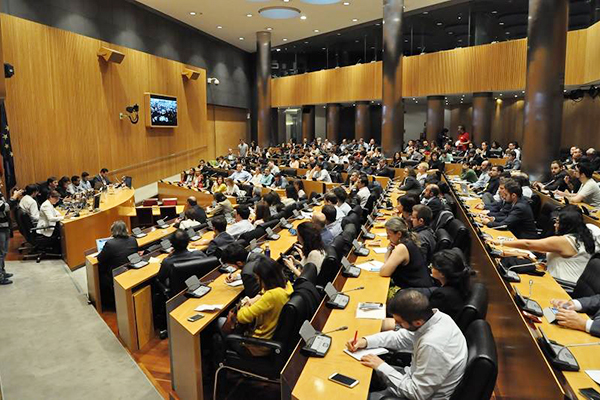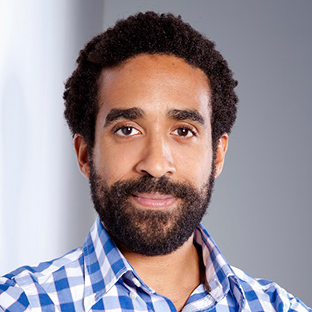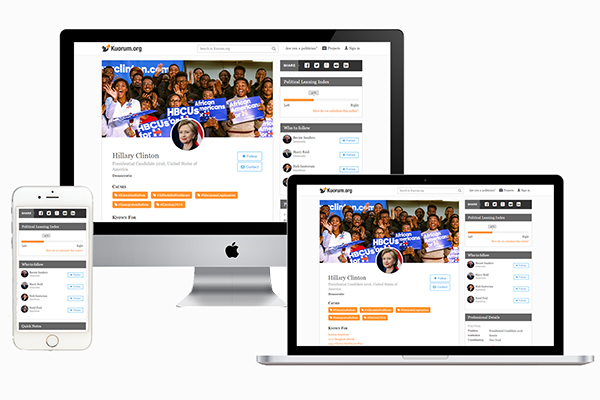'War without blood’: this is how Mao Tse-tung defined politics. A male chauvinist conception of the world, some may argue; though very suitable if we take a look at the recent history of modern democracies. Not in vain, Sun Tzu's 'The Art of the War' is one of the most read books among political communication experts. Know your enemies - Sun Tzu said - and know yourself, and you will not be imperilled in a hundred battles. But how easy is it to know your enemies, or even your allies, in the current times?
Three years ago we founded Kuorum.org with the mission of improving communication between politicians and citizens.
We soon realised that a basic premise to foster political engagement among the population is to go back to the most important asset in politics: people. We wanted every citizen in the world to have access to up-to-date information about their local, regional, and national political representatives. It sounds like a simple idea, but if you do the math it is indeed a titanic task.
Attending to the Democracy Index compiled by the Economist Intelligence Unit, there are 116 countries that can be classified as full or flawed democracies - as opposed to hybrid or authoritarian systems. Which means around three million elected politicians in democratic countries; three million people making decisions for four and a half billion citizens. Decisions that will eventually affect the whole world population. But who are these three million chosen ones? What are they currently working on? And, ultimately, how could we influence their decisions?
In order to provide simple answers to these questions, we recently launched the Internet Politician Database (IPDb), an open data project aimed at building a comprehensive database with all the politicians in the world.

The project was conceived as a transparency wiki where volunteering editors monitor their political representatives and academic supervisors look after the quality of data. So far more than 5,200 politician profiles have been uploaded and PhD laureates and professors at top universities such as Harvard and the London School of Economics have already joined the project. And, thanks to a collaboration agreement with UK-based MySociety, 60,000 more politician profiles will be added soon.
Along with the professional and personal details of every politician, the volunteers of the project collect the causes that their representatives are defending at any given time, thereby allowing Kuorum users to support these causes and build communities around them. Kuorum's algorithm calculates a political leaning index for every user in order to ease the rise of these lobbying communities.
Finally, those politicians who want to take control over their profiles can request an account activation. Parliamentarians, mayors, and city councillors in the UK, Spain, and Switzerland have already activated their profiles. Hopefully, many more will come, thereby helping us to build the 'peace without blood' for the years to come.
Kuorum.org is a social tech business based in Manchester. If you want to collaborate with us, please contact me at: info@kuorum.org.


Join the discussion
Comments
Please login to post a comment or reply
Don't have an account? Click here to register.
Wow, this looks fascinating - thanks for creating it. I've made a profile and will keep an eye on developments! As for the importance of showing the 'humanness' of people in powerful positions, I've found the same thing in delivering my free eCourse on the Politics in Education where I introduce each speaker beyond their (impressive but not inspiring) titles, by using an article or video showing them being real. So far it seems this touch has been beneficial in encouraging engagement with the details of what the speakers were presenting around the political levers over education. It seems people are taken more seriously when their reasons for acting the way they do are shown to come from themselves, if that makes sense. It's the same when I advice clients with job applications, where I make sure they present the reason they are looking to move on as theirs and empowering, so they're seen as attractive to others who might consider working with them. Best of luck with this project and thanks RSA for this post!
Thanks a lot for your reply Leah! And congratulations for your project, I already joined your free e-course and I am eager to see the first lecture :) Actually, we do also training courses and dissemination events. Because inclusion is one of the pillars of our vision - together with transparency and accountability. One of the drawbacks of online politics is that is out of reach for a part of the population. Therefore, at Kuorum, we work to reduce the digital divide by training people in risk of exclusion on how to participate in political life, and empower them to do so online. And with this purpose we created the consortium WE (http://we-europe.org) that already operates in Germany, Italy, Austria, Spain and Lithuania. We also collaborate with GlobalNet21 in the UK and other training organizations in Spain. If you think there could be synergies among our organizations just drop me an email ;)